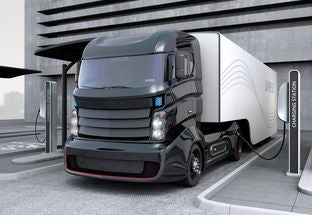
The EV market is on an accelerating trend. As the market and demand grows however, many are starting to ask the question: how will the electrical grids cope?
Alongside this as the everyday EV car market grows, several companies within the heavy goods vehicle market have begun exploring the potential for EV trucks. Although viewed as a positive step for the environment – due to reduced emissions – the design and engineering of electrical components is critical for widespread adoption of these vehicles.

Discover B2B Marketing That Performs
Combine business intelligence and editorial excellence to reach engaged professionals across 36 leading media platforms.
To find out more about these issues we spoke to Steve Hughes, managing director of EV component specialist REO UK.

Just Auto (JA): Could you provide me with some background on the company?
Steve Hughes (SH): REO is a fourth-generation family owned company, based in Germany and in operation since 1925.
It has four manufacturing sites, spread throughout Germany and a design and administration facility in central Berlin. It also has manufacturing capabilities in the USA, China, and India, with sales and service in most continents and geographical areas, the latest being an office in the UAE. The company employs 400 people globally.
REO is an acronym from the German phrase ‘Reclaime Erste Ordnung’ which roughly translates to ‘Provide First Class’. Its first products were for the control and critically dimming and brightening of cinema lights. This concept of switching things on and off, and the capability to control and regulate them using adjustable voltage and current has been key in the development of the company, its products, and the markets in which it operates.
What are some setbacks that electrical components such as those for the regenerative charging systems onboard EVs can face?
An electrical vehicle requires the same components as any other electrical system involving an electric motor and a drive and control system. This includes complex power electronics, capable of converting the DC from the battery into the AC voltage required by the motor. It must also be able to deliver this almost instantaneously to the motor when the driver needs it.
However, as in any other electrical system, this power conversion process creates electrical disturbances that, if not addressed, can damage the sensitive electronics on board a vehicle, and cause wider disturbances in and around the EV.
Smoothing these peaks and troughs of demand and dealing with the Radio Frequency Interference (RFI) that this drive generates is REO’s speciality. This is especially critical in EVs where the components will be expected to experience harsh environmental and mechanical strains.
As the electric commercial vehicle market increases, how should engineering of electrical components be designed to cope with the widespread adoption of EV trucks?
As with most product engineering, the power to weight ratio is key and this is especially true with EVs.
Removing excess weight throughout the design and manufacture of an EV offers some key benefits. It improves battery life, reduces the effects of mechanical issues, reduces the cost of ownership, and increases the useful driving time of the vehicle.
REO’s expertise is in the way that products can be modelled prior to manufacture to ensure that the product will perform as expected both electrically and mechanically.
Do you think that the electrical grid will be able to cope with the increased demand for EV charging in the coming years?
As it stands, the UK’s electrical grid will not be able to cope with future EV demand.
We all know that the half-time rush of kettle boiling during a football World Cup game causes the mains voltage to “sag”. Imagine, what would happen if millions of people plugged in their cars to charge at 6pm every evening when they got home?
Having said that, the growth in EVs provides a unique opportunity for charging from renewable sources and it is vital that there is a drive towards solar and wind generation on a micro and macro level to reduce the future burden on the grid.
What other solutions do you think could come to play to cope with the demand?
Any solutions designed to cope with EV demand must address two things: they must have a good range and be easy to charge.
Companies like Tesla stole a march on the inertia-bound auto industry by doing both of these things — and the cars also happened to be exciting to drive and look good. There is still an opportunity for car manufacturers to build on this by providing subsidised renewable generation and charging as part of the leasing or purchase package.
What do you think the future looks like for the EV world?
For REO, the future is hugely exciting. Whether vehicles are powered by batteries, hydrogen or some other fuel source, the thing that drives the wheels will be electricity.
What’s more, the control elements and the need for environmental and mechanical robustness will be exactly the same. REO doesn’t supply many components for conventional ICE vehicles, but when it comes to EVs, for us the sky is the limit.






